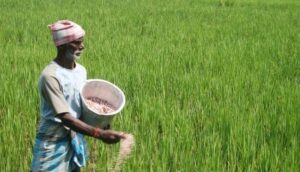Sangamithra Vijayan
Student of Advanced Zoology and Bio-Technology,
Chennai
India, an Agrarian country with about 70 per cent of the population depending on agriculture, faces a severe crisis in this crucial sector. Despite the rising secondary and tertiary sectors, agriculture remains the primary livelihood for many. However, India’s rich agricultural heritage is overshadowed by a pressing crisis in the sector. However, the rich agricultural heritage of India is marred by severe economic and psychological distress among farmers, leading to a troubling rise in suicides. Recent data from the National Crime Records Bureau (NCRB) reveal that 557 farmers committed suicide in the past six months, with the highest numbers from Telangana, Maharashtra, Karnataka, Chhattisgarh, Madhya Pradesh, and Andhra Pradesh.
Farmers are crucial for global food security by providing diverse foods that support balanced diets and prevent malnutrition.. They also manage natural resources through sustainable practices like crop rotation, organic farming, and conservation efforts, which maintain soil health, conserve water, and protect biodiversity. As Ratan Tata emphasizes, “The farm crisis has become a monumental catastrophe. It is a human tragedy that calls for urgent attention and action.”
Economic pressures are one of the major factors contributing to farmers’ distress. The high costs of seeds, fertilizers, insecticides, pesticides, and agricultural machinery impose a significant financial burden on farmers.
Many smallholders depend on monsoon rains for their crops. Unpredictable weather patterns, influenced by climate change, have led to frequent droughts and floods, destroying crop yields and leaving farmers in dire financial situations. The heavy reliance on monsoons and inadequate irrigation infrastructure make farming highly uncertain.
Many Indian farmers often find themselves trapped in a cycle of debt. They often borrow money from local lenders at high interest rates to finance their agricultural activities. When crops fail or market prices drop repaying these loans becomes nearly impossible, worsening their financial strain. The financial strain is further compounded by fluctuating market prices and inadequate support prices for their produce. In many cases, farmers are forced to sell their produce at a loss, worsening their financial troubles. Arundhati Roy underscores the need for action, stating, “The plight of farmers in India is a tragic story of neglect and broken promises. The increasing number of farmer suicides is a stark reminder of the need for systemic change.”
Government support mechanisms, such as minimum support prices (MSP) and subsidies, are often criticized for their inadequacy and poor implementation. Many farmers are also unaware of available schemes or face difficulties in accessing them due to bureaucratic obstacles.
Government support mechanisms, such as minimum support prices (MSP) and subsidies, are often criticized for their inadequacy and poor implementation. Many farmers are also unaware of available schemes or face difficulties in accessing them due to bureaucratic obstacles.
Rural India faces significant socio-economic disparities. Farmers in different regions have varying access to resources, education, and healthcare. In less developed states, poor infrastructure, such as inadequate roads and storage facilities, hampers the effective marketing of the produce. Limited access to modern technology, training, and support services can hinder farmers’ productivity and efficiency.

The combined impact of these stresses has led to severe mental health crisis among farmers. The weight of debt, coupled with crop failures and insufficient support, has driven many to take their own lives. Overwhelmed and unable to escape their financial struggles or provide for their families, some farmers tragically resort to suicide using pesticides. P. Sainath highlights this grim reality: “India cannot call itself a prosperous nation until it addresses the suffering of its farmers. Their struggles are the true measure of our progress.”
Although the Indian government has introduced measures such as loan waivers, increased MSPs, and insurance schemes, these interventions often fail to address the root causes of the crisis. Comprehensive reforms are needed to improve access to credit, enhance agricultural infrastructure, ensure fair pricing, and provide mental health support.
Addressing the plight of Indian farmers requires a multi-faceted approach. Investments in irrigation, better crop insurance schemes, and improved market access can help reduce vulnerability. Supportive policies that ensure fair prices, provide subsidies, and offer financial assistance can stabilize farmers’ economic conditions. Enhancing agricultural technology, research, and education can enhance productivity and sustainability. Training programs can equip farmers with the knowledge and skills to adapt to changing conditions. Promoting sustainable farming practices and environmental stewardship can mitigate climate change impacts and preserve natural resources. Strengthening mental health support systems is crucial for providing necessary psychological and emotional assistance. Community initiatives that recognize and celebrate farmers’ contributions can support rural development.
Farmers are indispensable to society, contributing to food production, economic development, environmental management, and cultural preservation. Recognizing their vital role and addressing their challenges is essential for ensuring a resilient and sustainable agricultural sector. By supporting farmers, we not only secure our food supply but also enhance the well-being of communities and the health of our planet.








